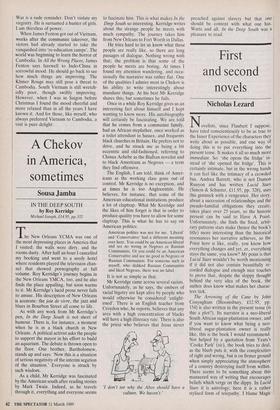A Chekov in America, sometimes
Sousa Jamba
IN THE DEEP SOUTH by Roy Kerridge Michael Joseph, £14.95, pp.332 The New Orleans YCMA was one of the most depressing places in America that I visited: the walls were dirty, and the rooms dusty. After half an hour I cancelled my booking and went to a seedy hotel where residents played the television chan- nel that showed pornography at full volume. Roy Kerridge's journey begins in the New Orleans YMCA, too, and he also finds the place appalling, but soon warms to it. Mr Kerridge's lucid prose never fails to amuse. His description of New Orleans is accurate: the joie de vivre, the jazz and blues in Bourbon Street all come to life.
As with any work from Mr Kerridge's pen, In the Deep South is not short of humour. There is, for instance, a moment when he is in a black church in New Orleans. A political activist asks the people to support the mayor in his effort to build an aquarium. The debate is thrown open to the floor. One brother, Bartholomew, stands up and says: 'Now this is a situation of serious negativity of the interim segation of the situation.' Everyone is struck by such wisdom.
As a child, Mr Kerridge was fascinated by the American south after reading stories by Mark Twain. Indeed, as he travels through it, everything and everyone seems
to fascinate him. This is what makes In the Deep South so interesting. Kerridge writes about the strange people he meets with much sympathy. The journey takes him from New Orleans to Fort Worth in Dallas.
He tries hard to let us know what these people are really like, so there are long passages of dialogue. Nothing wrong with that; the problem is that some of the people he meets are boring. At times I found my attention wandering, and occa- sionally the narrative was rather flat. One of the qualities I admire most in Chekov is his ability to write interestingly about mundane things. At his best Mr Kerridge shares this; but sometimes he fails.
Once in a while Roy Kerridge gives us an interesting fact about himself and I kept wanting to know more. His autobiography will certainly be fascinating. We are told that he comes from a communist family, had an African stepfather, once worked as a toilet attendant in Sussex, and frequents black churches in Britain. He prefers not to drive, and he struck me as being a bit eccentric and old-fashioned, referring to Chinua Achebe as the Biatran novelist and to black Americans as Negroes — a term they find offensive.
The English, I am told, think of Amer- icans as the working class gone out of control. Mr Kerridge is no exception, and at times he is too Anglocentric. He believes, for instance, that some of the American educational institutions produce a lot of claptrap. What Mr Kerridge and the likes of him forget is that in order to produce quality you have to allow for some claptrap. This is what he has to say on American politics:
American politics was not for me. 'Liberal' and 'Conservative' had a different meaning over here. You could be an American liberal and see no wrong in Negroes or Russian Communists. Or you could be an American Conservative and see no good in Negroes or Russian Communists. For someone such as myself, who disliked Russian Communists and liked Negroes, there was no label.
It is not as simple as that.
Mr Kerridge came across several racists. Unfortunately, as he says, the embers of racial bigotry are kept alive by people who would otherwise be considered 'enlight- ened'. There is an English teacher from Croydon who, he reports, believes that any area with a high concentration of blacks will have a high illiteracy rate. There is also the priest who believes that Jesus never 'I don't see why the Abos should have a culture. We haven't.' preached against slavery but that one should be content with what one has. Warts and all, In the Deep South was a pleasure to read.


























































 Previous page
Previous page